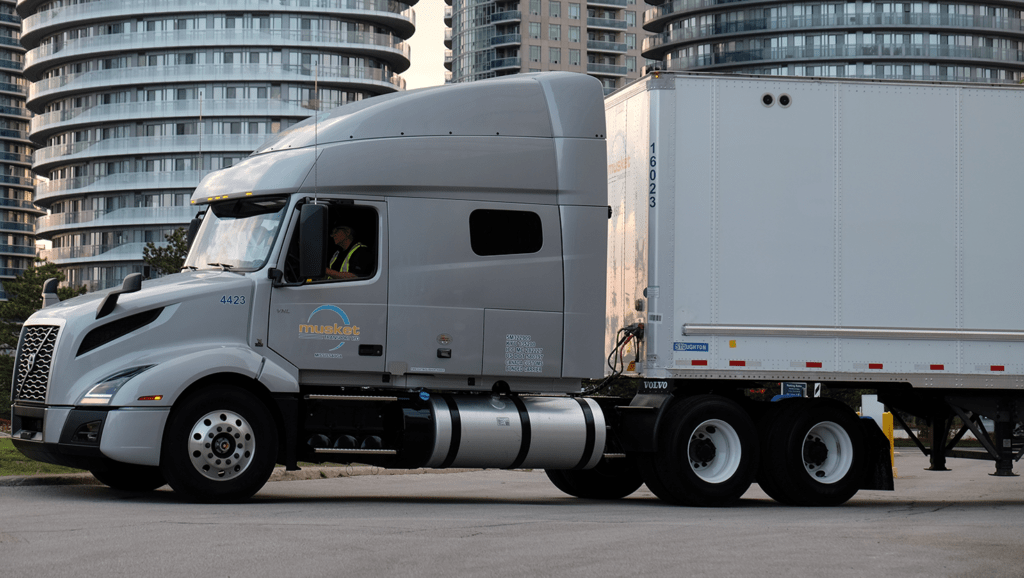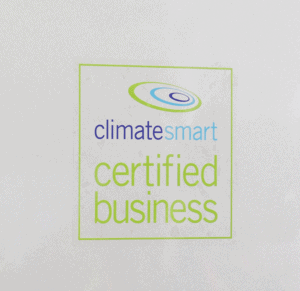My five year old fist shook at the tractor trailer barrelling by, puffs of black smoke spouting from its exhaust. An exact vision of what my science teacher said was hurting the environment. In the quarter century since then, the trucking industry has taken huge steps to become more sustainable. I also learned to drop my naivety and started to recognize the integral role commercial trucking plays in our lives. Especially when 90% of Canada’s consumer products and foodstuffs are transported via freight truck. Although one cannot ignore the GHG (greenhouse gas) emissions that result from trucking, Canadians would be helpless without the industry. Even with exorbitant operating costs and the ever constant pressure of providing goods on time, Musket Transport and CHET (Commercial Heavy Equipment Training Ltd.) work hard to be industry leaders in terms of sustainability and combat the raising GHG emissions.
If you have driven on highways over the last 25 years, you’ll have noticed the difference in the trucks that you pass. You see less of the massive square bodies and more of the streamline models; sleek with dynamic bodies made to navigate the roads. One reason for this change in body is simply to combat against air resistance and drag. Although it may seem minuscule, over a truck’s lifespan, the extra force the truck needs to exert can lead to hundreds of gallons of fuel wasted. In order to decrease their carbon footprint, Musket Transport came to the decision of replacing their trucks with the 2018 Volvo VNL 740. With it’s low-profile roof and contoured body, the VNL740 is able to offer a 16% improvement in fuel efficiency. Because of the success found with the Volvo VNL740s, the decision was made to acquire 50 Volvo VNR660s which will be in force by early June. The VNR660’s new lightweight body and its longer trailer capabilities allow for drivers to increase their payloads without sacrificing efficiency. The additional carrying capacity grants Musket Transport the ability to perform B-Trains and Rocky Mountain B-Trains: multiple containers carried at once to limit the number of trips made for goods resulting in less fuel consumption. Musket Transport has since seen an increase in their bottom line and hauling capacity by making the decision to invest green.

Driving practices themselves contribute greatly to the amount of fuel consumed. In the past, it wasn’t uncommon to see trucks speeding by; rushing to get to their destination in the best time. Not only was it obviously unsafe, it wasted tremendous amounts of fuel. To make sure their alumni are fuel efficient as possible, CHET is a part of the Smart Driver for Highway Trucking training program. SDHT training is made with beginner and experienced drivers in mind to create an industry standard of fuel efficiency across all demographics. With in depth teaching and on hands training, students are able to learn the proper driving practices, such as driving slower and limiting lane switching, to save their operator’s money as well as the planet’s wellbeing. Before students are even on the road, CHET uses their state of the art multi- head set VR simulator to completely immerse students into the driving experience. Data analytics and facial recognition work simultaneously with the VR headset to analyze all the students driving patterns, down to even the most minute details such as eye movements, providing insights on how to improve their practices. CHET is the first and only Canadian school to use the critically acclaimed IRIS by IMVR. By the time CHET students are on the road, they are already accustomed to these gas saving practices. This training has led to most fleet owners noticing a 1.5% to 3% savings in their monthly fuel cost. By reducing the fuel consumption, we are able to limit the emissions and the stress of producing more. Because of its financial benefit, more and more fleet owners are able to recognize the need to make the change.
In order to document our pledge to sustainability, Musket Transport worked diligently to become the first Ontario Company to achieve their Climate Smart Certification. In order to get the certification, Musket Transport worked with a Climate Smart representative to learn how to track their GHG emission levels and calculate their carbon footprint. With this data in mind, Musket Transport created a list of action points to better their impact on the environment.
The plan was broken down as such:
- 2018 Investment in new low emission Volvo VNL 740 trucks.
- New fuel contract that results in less idling at our Cawthra and Royal Windsor terminals.
- New Waste Management contract for waste removal and recycling programs at Cawthra and soon to be extended to Royal Windsor and Southdown terminals.
- Complimentary LED retrofit program for paving projects at Cawthra and Royal Windsor yards.
- Ongoing promotion of the SmartDriver Highway Trucking Course at CHET.
- CHET to partner up with Musket’s Driver Management Team and Safety & Compliance Department for SmartWay fuel efficiency training for experienced drivers.

Both CHET and Musket Transport believe in building up the community around them. This sentiment stays true with their commitment to sustainability and environmental awareness. In 2019, CHET and Musket Transport inquired about becoming members of the The Peel Goods Movement Task Force. The Task Force works to alleviate and solve the issues of transportation congestion which negatively affects the region and its people. Since their fruition, they have created the Smart Freight Centre in collaboration with Region of Peel, McMaster University, University of Toronto and York University. The Smart Freight Centre conducts research into regional transportation and goods movement issues before working to create innovative and effective solutions that best fit their area. On March 4th, 2019, both Musket Transport and CHET became official members of the Task Force. Making CHET the first driver training school to be recognized as a member.


Contradictory to their mainstream image, truckers are some of the greatest lovers of nature. Spending their days travelling gruelling roads to the most magnificent views; fighting against Mother Nature and respecting all her wraith. To disregard their efforts despite the constraints and the obstacles they face is disrespectful to those who help the country keep moving. Although there is still a way to go before zero emissions and cutting the reliance on diesel, the trucking industry is constantly evolving and striving to become as sustainable as possible. Both CHET and Musket Transport work diligently within the industry and the community to be leaders in sustainability and environmental awareness. Musket Transport has recently been recognized by Pembrina for their environmental efforts, solidifying their rank as one of the most sustainable trucking companies in Canada.


